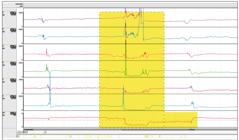ABSTRACT
BACKGROUND:
Prolonged monitoring increased our knowledge on gastroesophageal reflux (GER), and the disease became known as gastroesophageal reflux disease (GERD). Prolonged reflux monitoring permits the diagnosis of GERD when endoscopic findings are not enough to characterize it.
OBJECTIVE:
The objective of this paper is to review the current knowledge on impedance-pH monitoring, taking into account the published literature and the authors experience with 1,200 exams.
METHODS:
The different types of prolonged reflux monitoring, namely: conventional pHmetry, catheter-free pHmetry and impedance-pHmetry will be briefly described. The new possibilities of evaluation with impedance-pHmetry are emphasized, namely: the study of symptomatic patients in use of proton pump inhibitors (PPIs); evaluation of patients with symptoms suggestive of GERD although with normal endoscopy and normal pHmetry, diagnostic elucidation of patients with atypical symptoms or supra-esophageal symptoms, mainly chronic cough, study of patients complaining of belch, differentiating gastric and supra-gastric belching, and the proper work-up before anti-reflux surgery.
RESULTS:
When impedance was associated to pH monitoring, an impressive technological evolution became apparent, when compared to pH monitoring alone. The main advantages of impedance-pHmetry are: the ability to detect all types of reflux: acid, non-acid, liquid, gaseous. In addition, other important measurements can be made: the ability of the esophagus in transporting the bolus, the measurement of basal mucosal impedance and the evaluation of primary peristalsis post reflux.
CONCLUSION:
Impedance-pHmetry is a promising method, with great advantages over conventional pHmetry. The choice between these two types of monitoring should be very judicious. The authors suggest the importance of careful evaluation of each reflux episode by the physician responsible for the examination, necessary for the correct interpretation of the tracings.
HEADINGS:
Gastroesophageal reflux; Esophageal pH monitoring; Electric impedance

 Thumbnail
Thumbnail
 Thumbnail
Thumbnail
 Thumbnail
Thumbnail
 Thumbnail
Thumbnail



